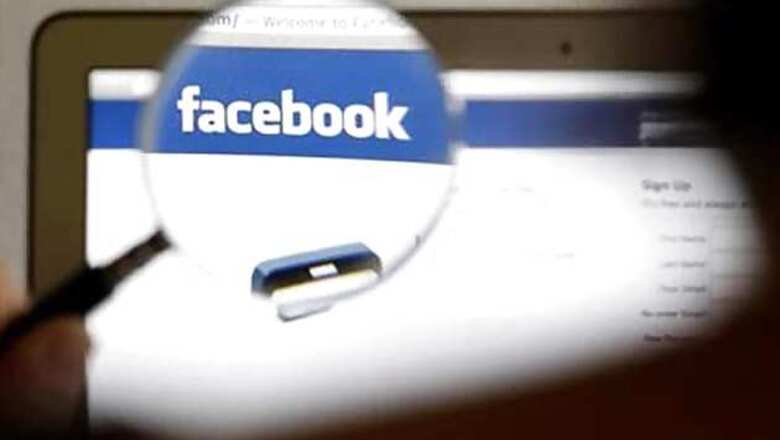
views
San Francisco/New York: Facebook Inc shares sank as much as 7.1 per cent to a record low after early investors got the greenlight to sell for the first time since the No. 1 social network went public, starting a string of insider lockup expirations expected to pressure the stock for months.
More than 270 million shares owned by early investors became available for trade on Thursday. That's more than half the 421 million shares sold in the May initial public offering.
Investors were also unnerved by the prospect of about 2 billion new Facebook shares hitting markets by year's end, tripling its shares available for public trading. Most Facebook employees can start selling their shares in November.
With Thursday's selloff, Facebook has lost $40 billion, or just under 50 per cent, of its market value since its IPO on May 18.
The stock, which debuted at $38, hit a session low of $19.69 on Nasdaq, before trading down 5 per cent at $20.13 early Thursday afternoon.
"Pressure will be back on the shares now that liquidity is back in the market," said Frank Davis, director of sales and trading at LEK Securities in New York. "If (the value of) your holdings has been cut in half, are you going to sit around and risk the rest of that?"
Facebook has been wildly volatile, moving more than 3 per cent in most sessions.
Roughly 64 million shares of Facebook changed hands in the first hour of trading on Thursday, more than double its 50-day daily average of just under 30 million shares.
Analysts said it wasn't clear whether the selloff was actually driven by insiders or by other shareholders worried about potential insider selling.
Among the largest blocks of shares now available for trading are about 75 million shares owned by Russia's DST Global Limited and Mail.ru. Other potential sellers include venture capital firm Accel Partners and PayPal co-founder Peter Thiel.
"I don't think you're going to see all the supply come to market on Day One. People will wait until they think there will be a little bit of a price lift," said Evercore Partners analyst Ken Sena.
"You could say some of the concerns got priced in, and now it's a question how much demand is there to absorb the increased supply," he said.
Founded in a Harvard dorm room in 2004 by Chief Executive Mark Zuckerberg, Facebook has become the world's No. 1 Internet social network, challenging established Web giants such as Google Inc and Yahoo Inc for consumers' online time and for advertising dollars.
More shares coming
After staging one of the most highly anticipated IPOs in history and becoming the first U.S. tech company to debut with a market valuation of more than $100 billion, Facebook has felt the sting of investor disenchantment.
Concerns about the company's slowing revenue growth, and its ability to make money on mobile advertising, have pressured the stock.
With Facebook's stock trading at $20, Zuckerberg, 28, who controls a majority of the company's voting power, has now watched more than $9 billion evaporate from his net worth.
"You've had a failed IPO, the stock has been cut in half, a sloppy quarter and a big lock-up expiring. Every one of those tends to erode faith," said Michael Binger, a portfolio manager at Gradient Investments, whose firm does not have a position in Facebook.
With Facebook still trading at 40 times its expected 2012 earnings - compared to 16 for Google and 14 for Apple Inc - Binger said he did not see a buying opportunity until the company's revenue growth starts to re-accelerate.
Another 243 million shares will be released from lock-up between mid-October and mid-November. On November 14, more than 1.2 billion shares will be available for trading. Mark Zuckerberg will not be able to sell his shares until then.
"The biggest issue is not this lock-up; it's the November lock-up," said Pivotal Research Group analyst Brian Wieser.
If the company's perceived operating momentum doesn't improve by then, he said, "then there's real trouble ahead."
Going short
As the insider lockups started to expire, the number of Facebook shares shorted hit a new high of 92.6 million shares on Thursday, according to Sungard Financial Systems' Astec unit, which tracks short interest. That would represent roughly 13 per cent of the company's float of 692 million shares.
Short sellers borrow shares to sell them, betting that they can buy the securities later at a lower price and make a profit.
The cost of shorting Facebook shares has fallen sharply since their debut in May, because the stock is now easily available to borrow. As of Thursday, the cost of borrowing the Facebook shares was about 1.6 per cent per annum on an annualized basis, compared to 40-50 per cent when the stock made its debut in May.
On Thursday morning, 600,000 shares were shorted, "due in part to the relatively inexpensive rate at which short sellers must pay to sell short," said Tim Smith, executive vice president of Sungard's Astec unit.
"Even though Facebook's market cap has almost been cut in half since its IPO, many investors believe that shares are still overvalued," Smith said.
Short interest has steadily climbed from 25 million shares on May 22 to 92.6 million, according to the data by Sungard.
"There are still at least 30 million Facebook shares that institutional investors are willing to lend to short sellers as of this morning, so the cost-to-short should not increase in the near-term, however, investors should continue to monitor the cost-to-short going forward," Smith said.
Short interest figures calculated by the Nasdaq Stock Market, which is released on a lagging basis twice a month, shows 61.3 million shares were shorted as of the end of July; the newest figures on short interest will not be released until August 24.




















Comments
0 comment